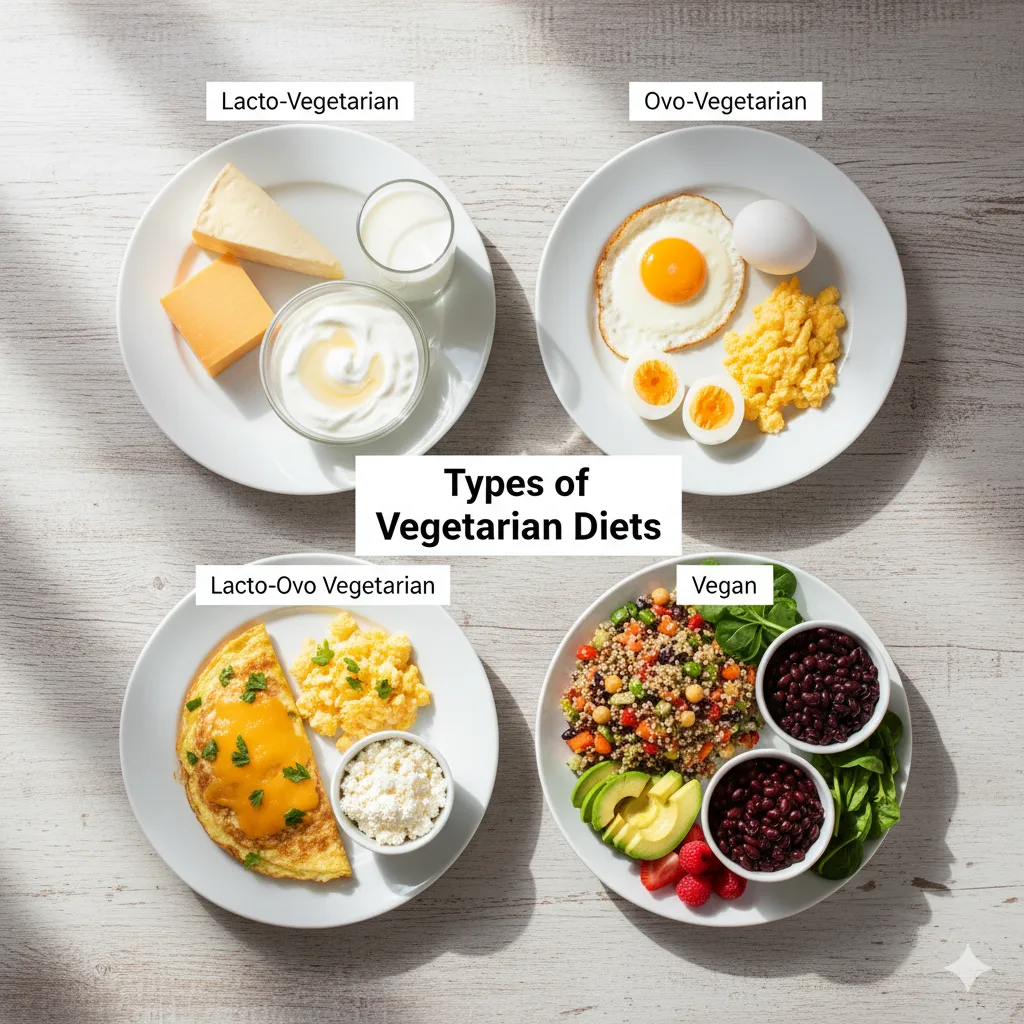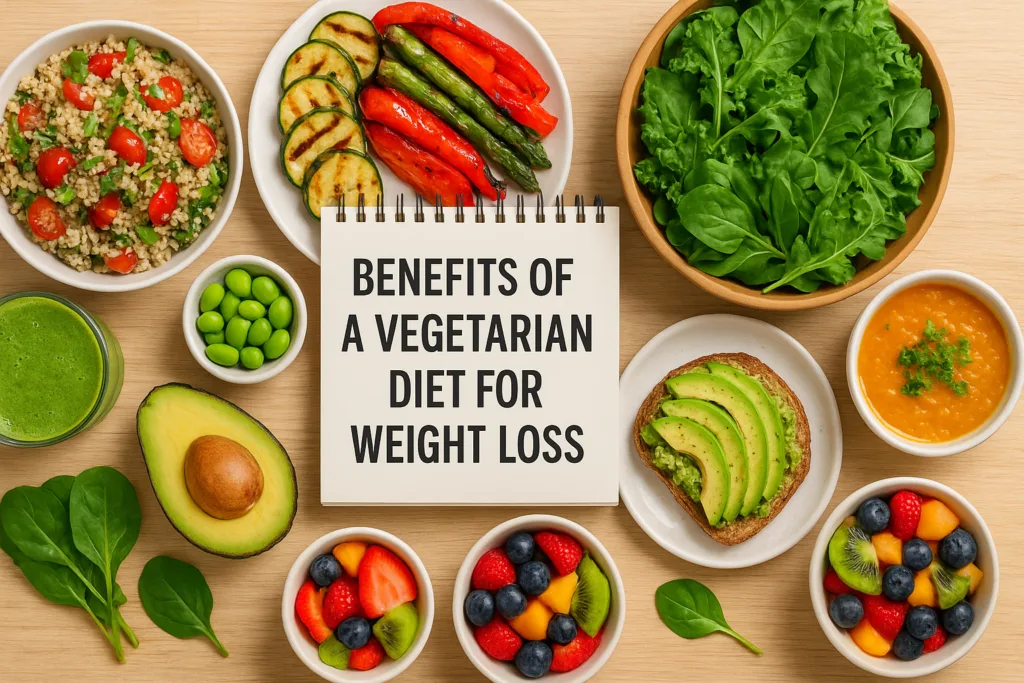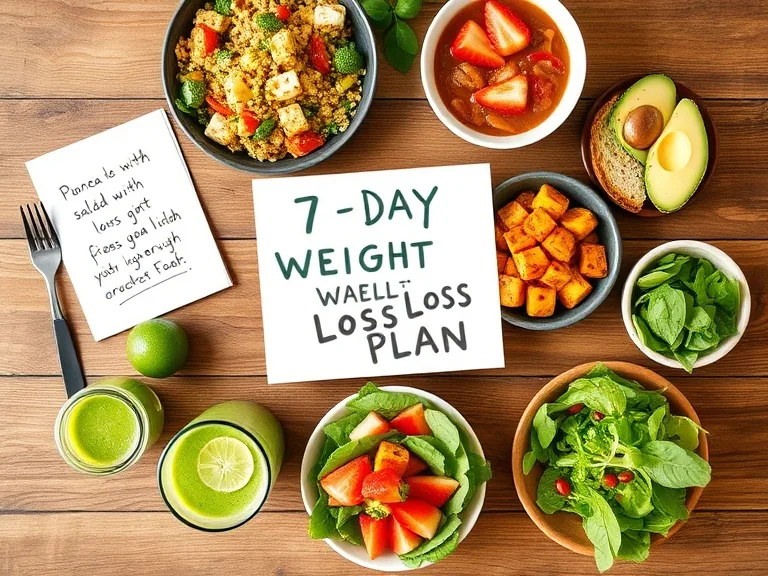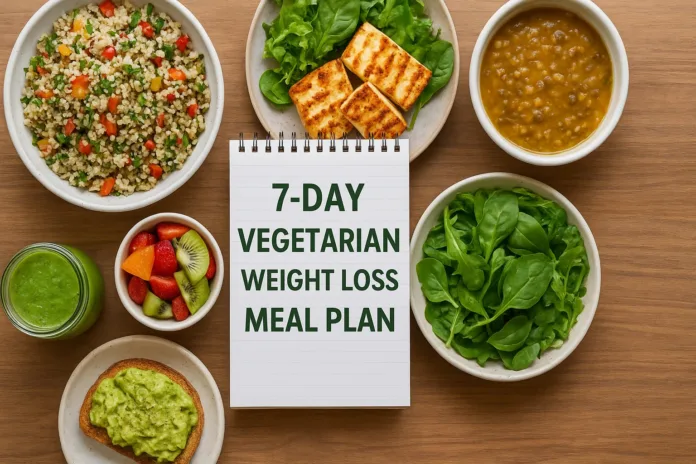Thinking of weight loss or trying to eat better? You may be thinking of going vegetarian. It is said that you can’t eat as many calories when you cut out meat and focus on plant-based foods like fruits, vegetables, whole grains, legumes, and nuts because they will fill you up for a longer period of time. A vegetarian diet is a good way to lose weight and can be kept off for a long time.
Many people choose a vegetarian diet out of animal love, but this diet has its own benefits.
So what’s the real benefit? Studies indicate that plant-based eating patterns such as vegetarianism can promote weight loss simply by cutting back on calorie‑dense, processed foods. By emphasizing fiber‑rich choices, like vegetables, beans, and whole‑grain products, you stay satiated longer, consume fewer calories, and keep cravings at bay, all without feeling like you’re missing out.
What Is a Vegetarian Diet?
A vegetarian diet is a way of eating that eliminates all meat, such as beef, chicken, and fish, and centers on plant-based foods. It fills the plate with vegetables, fruits, whole grains, beans, nuts, and seeds. Some vegetarians also incorporate dairy and eggs, depending on their personal preferences.
There are many reasons for transitioning to vegetarianism, whether from an environmental standpoint, animal rights, a sense of compassion, or health benefits. A properly thought-out vegetarian diet will provide, in addition to a review of all the vitamins and minerals the body requires, weight gain reduction and improved overall health.
Types of Vegetarian Diets

There’s no one-size-fits-all approach to being vegetarian. Individuals choose different approaches depending on what best fits their bodies and lifestyles.
- Lacto-vegetarians: consume dairy (milk, cheese, and yogurt) but avoid meat, fish, and eggs.
- Ovo-vegetarians: consume eggs but avoid meat, fish, and dairy.
- Lacto-ovo vegetarians – this is the most common type of vegetarian that includes dairy and eggs but avoids meat and fish products.
- Vegans :avoid all animal products – no meat, dairy, eggs, or any other products from animals.
Can I Lose Weight with a Vegetarian Diet?
Can a vegetarian diet help you lose weight? Yes, but it’s not just about cutting out meat. The real benefit comes from the foods you replace it with. Filling your meals with whole, plant-based options-such as vegetables, beans, whole grains, and nuts-means you’re eating foods that are naturally lower in calories yet rich in fiber and nutrients. This keeps you fuller longer, tames cravings, and supports steady, healthy weight loss. So the emphasis should be on what you add, not merely on what you eliminate.
A 2015 review in the journal Nutrients, authored by researchers from Ghent University (Belgium), showed that people on vegetarian and vegan eating plans lost markedly more weight than those following conventional low-calorie diets, even when their calorie intake was identical. In a separate study by the Physicians Committee for Responsible Medicine, published in the Journal of the Academy of Nutrition and Dietetics, participants on a vegetarian diet shed nearly twice as much weight over 18 weeks compared with those on a non-vegetarian regimen.
Benefits of a Vegetarian Diet for Weight Loss

Low Calorie Density and High Fiber
Plant foods are low in calories but high in fiber; you’ll be able to consume bigger portions while ultimately feeling full longer, which naturally reduces the tendency to overconsume.
Reduced Intake of Saturated Fats
Decreasing the intake of meat will decrease the consumption of saturated fats, which aids in maintaining a better ratio of fats, which also helps with weight management.
Portion Control and Satiety
A vegetarian diet will result in improved digestion, better nutrient and vitamin intake, and a more efficient metabolism, which ultimately helps provide better weight loss results.
Lower Risk of Chronic Diseases
A vegetarian diet is very low in obesity-linked ailments such as high blood pressure, type 2 diabetes, and elevated cholesterol, while also aiding natural weight control.
Improved Digestion and Gut Health
Consuming plenty of fiber-rich plant foods nourishes the beneficial gut microbes, which can aid digestion, lower inflammation, and promote a healthy metabolism.
Increased Nutrient Intake
A vegetarian diet features a range of fruits, vegetables, and whole grains, delivering the vital minerals and nutrients your body needs to stay healthy and energized.
Vegetarian Foods for Weight Loss
If you are considering a vegetarian diet for weight loss, it’s not just about what you’re eliminating from your diet – it’s about what you’re bringing on your plate. Choosing whole, nutrient-dense foods will allow you to feel satisfied, maintain your energy, and manage your cravings.
1. High-Protein Vegetarian Foods
- Lentils & Chickpeas – Excellent for soups, stews, or salads;
- high in protein and fiber.
- Tofu & Tempeh – Soy proteins that can be used in stir-fries, curries, or grilled.
- Edamame – A high-protein snack or salad ingredient.
- Eggs – A complete protein, perfect for breakfast or a quick meal.
- Greek yogurt & cottage cheese – High in protein and calcium (if included in your diet).
2. Low-Calorie, Nutrient-Dense Vegetables and Fruits
Vegetables
- Leafy Greens: spinach, kale, lettuce
- Cruciferous vegetables: broccoli, cauliflower, cabbage
- Other vegetables: zucchini, cucumber, bell peppers, carrots
Fruits
- Berries
- Apples
- Pears
- Oranges
- Grapefruit
- Melon
3. Whole Grains and Legumes
Whole grains and legumes are great sources of complex carbohydrates, fiber, and plant-based protein. They are digested more slowly and can help keep you full and help you have stable energy levels throughout the day.
You can try:
- Quinoa – Not only is it a complete protein, but it can also serve as a great substitute for rice.
- Oats – A great choice in the morning; keeps you satiated and supports digestion.
- Brown rice, bulgur, barley – Better than refined grains.
- Black beans, kidney beans, green peas – Great toppings for bowls, soups, and salads.
Tip: Choose whole grains instead of refined carbohydrates, like white rice or white bread, as they raise blood sugar levels and contribute to hunger.
4. Healthy Fats
Fats are higher in calories; however, they play important roles in hormone regulation, brain function, and absorption of nutrients. When consumed in moderation, fats can also keep you feeling full after meals. Some healthy fats you eat:
- Avocados – Can be used in salads, smoothies, or on toast.
- Nuts/seeds – Almonds, walnuts, chia seeds, flaxseeds (keep portions in check).
- Nut butters – Choose nut butters that are natural with no added sugar.
- Olive oil – Good selection for cooking and salad dressings.
What Nutrients to Focus on in a Vegetarian Diet Plan?
| Minerals & Nutrients | Importance | Sources |
|---|---|---|
| Protein | Promotes muscle growth and keeps you satisfied. | Lentils, beans, tofu,eggs, yogurt, quinoa, nuts |
| Zinc | Enhance immunity and metabolism rate | Chickpeas, lentils, seeds, whole grains |
| Iron | Boost energy and improve blood health | Lentils, spinach, beans, seeds, fortified cereals. |
| Vitamin B12 | Enhance energy and brain function | Nutritional yeast, fortified plant milk, |
| Omega-3s | Improves heart and brain health | Chia seeds, flaxseeds, walnuts, algae-based supplements |
| Calcium | Strong bones and teeth | Fortified plant milk, tofu, almonds, leafy greens |
| Vitamin D | Make bones stronger andhelps in calcium absorption | Sunlight, fortified foods |
7-Day Vegetarian Weight Loss Meal Plan

Day 1
- Breakfast: Overnight oats with chia seeds, almond milk, and blueberries
- Lunch: Chickpea and cucumber salad with lemon-olive oil dressing
- Dinner: Grilled tofu with stir-fried vegetables and brown rice
- Snack: A small apple with peanut butter
Day 2
- Breakfast: Greek yogurt with sliced banana and flaxseeds
- Lunch: Quinoa bowl with black beans, corn, salsa, and avocado
- Dinner: Lentil and vegetable curry with a small serving of basmati rice
- Snack: Carrot sticks with hummus
Day 3
- Breakfast: Smoothie with plant protein powder, spinach, berries, and oat milk
- Lunch: Sweet potato and chickpea wrap with tahini sauce
- Dinner: Baked stuffed bell peppers with quinoa, veggies, and kidney beans
- Snack: Greek yogurt or a handful of walnuts
Day 4
- Breakfast: Chia pudding with almond milk and diced mango
- Lunch: Vegetable stir-fry with tofu and soba noodles in a light soy-ginger sauce
- Dinner: Creamy broccoli soup (made with low-fat milk or plant milk) and a side salad
- Snack: Rice cakes with almond butter
Day 5
- Breakfast: Oatmeal with cinnamon, chopped apples, and a spoon of almond butter
- Lunch: Spinach salad with roasted chickpeas, cherry tomatoes, cucumbers, and olive oil
- Dinner: Vegetable korma with paneer (or tofu) and ½ cup of brown rice
- Snack: A small fruit smoothie or roasted seeds
Day 6
- Breakfast: Whole-grain toast with avocado and tomato slices
- Lunch: Lentil soup with a slice of whole-grain bread
- Dinner: Tempeh stir-fry with zucchini, carrots, and cauliflower rice
- Snack: Air-popped popcorn or dark chocolate square
Day 7
- Breakfast: Protein smoothie bowl topped with granola, chia, and berries
- Lunch: Roasted veggie quinoa bowl with tahini-lime dressing
- Dinner: Vegan chili with black beans, tomatoes, corn, and spices
- Snack: Fruit salad with sunflower seeds
Daily Nutrient Breakdown
| Nutrient | Daily goal | Sources |
| Protein | 60-80g | Tofu, lentils,yougurt, rtempeh |
| Fiber | 25-35g | Vegetables, fruits, legumes, oats |
| Healthy Fats | 2-3 servings | Nuts, seeds, olive oil, avocado |
| Calories | 1500-1600 | Varies by activity level |
Common Myths About Vegetarian Diets and Weight Loss
There are plenty of misconceptions about vegetarian diets, especially when it comes to losing weight. Like:
Myth 1: You Won’t Get Enough Protein
A common assumption is that a vegetarian diet is one that does not consume meat. However, plant foods, including beans, lentils, tofu, tempeh, nuts, and dairy (for those who consume dairy), are rich protein sources for muscle health and energy.
Myth 2: You’re Always Hungry
High-fiber vegetables, whole grains, and legumes do, in fact, keep you full longer, meaning you’ll feel hungry less when you’re eating a vegetarian diet.
Myth 3: A Vegetarian Diet is Always Healthy
Becoming a vegetarian is not synonymous with becoming healthy. You want to avoid any processed foods, sugar-stuffed snacks, or white products. Go with whole foods and foods that are nutrient-dense.
Myth 4: It’s Hard to Get Enough Iron When Not Eating Meat
Although meat is a source of iron, plant-based iron sources are found in spinach, lentils, beans, and fortified cereals. Pairing these foods with vitamin C will help your body absorb the non-heme iron better.
Myth 5: Vegetarian Diets Are Expensive and Complicated
A vegetarian diet can be cost-effective and budget-friendly, too. Simple basic foods like rice, seasonal veg, and oats are under budget and adaptable.
Final Takeaway: Is a Vegetarian Diet Right for You?
A vegetarian diet is a very effective method to improve one’s overall health, especially if you want to lose weight and want to keep it consistent. Vegetarian diets include nutritious, wholesome, fiber-rich foods, which should keep you satisfied and energized. In addition, many people experience lower rates of heart disease and diabetes.
Conversely, a vegetarian diet may not be for everyone. Some people may need to plan their food consumption, depending on the timing of food consumption, if they need less protein, iron, and vitamin B12.
When adding a vegetarian diet into your eating plan, start slowly by changing one or two meals per week and eating whole food plant-based meals that focus on different beans, vegetables, grains, and one-ingredient soups.
And if you are a non-vegetarian and you suddenly decide to turn to a vegetarian diet or have any health issues, it is always best to consult your doctor.
FAQ’s
1. How to lose 5kg in 7 days on a vegetarian diet?
Breakfast: whole grain toast with peanut butter, 1 banana, and black coffee.
Mid-morning snack: apple or baby carrots, herbal tea
Lunch: mixed green salad with chickpeas and olive oil dressing.
Afternoon snack: a handful of almonds, green tea, or herbal tea.
Dinner: stir-fried tofu with steamed broccoli and brown rice.
2. Vegetarian diet for diabetes?
Breakfast:
Steel cut oats with chia seeds and berries.
Unsweetened green tea.
Mid-morning snack:
Handful of almonds.
Lunch:
Salad of mixed greens with lentils in an olive oil dressing.
Quinoa or brown rice.
Snack:
Veggie stick and hummus
Dinner:
Stir-fried tofu with broccoli and bell peppers
An inclusive small serving of avocado
Water or herbal tea all day.
3. Is a vegetarian diet helpful in weight loss?
Certainly a vegetarian diet can aid in weight loss when it is balanced and appropriately planned. Plant foods are lower in calories and higher in fiber, thus helping to curb hunger and facilitate digestion. Choosing whole grains, legumes, vegetables, and good fats can lead to consistent and sustainable weight loss.
4. Can a vegetarian diet cause hair loss?
A vegetarian diet may lead to hair loss if it does not include important nutrients like protein, iron, zinc, biotin, or vitamin B12, which promote healthy hair growth. Usually, you can avoid this consequence with a well-rounded diet that includes:
Legumes, tofu, and nuts (for protein & zinc)
Leafy green vegetables and lentils (for iron)
Fortified foods or supplements (for B12)
Whole grains and seeds (for biotin)
5. What’s the best vegetarian food to build muscle?
Plant‑based muscle-building foods include lentils, beans, tofu, tempeh, quinoa, Greek yogurt, nuts, seeds, and chickpeas.

